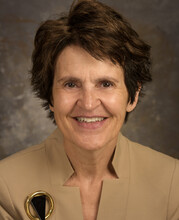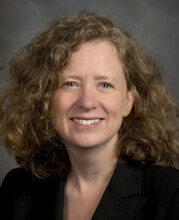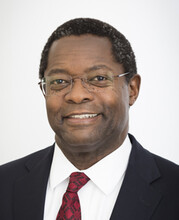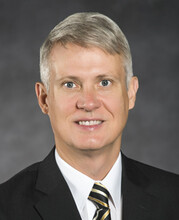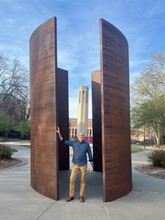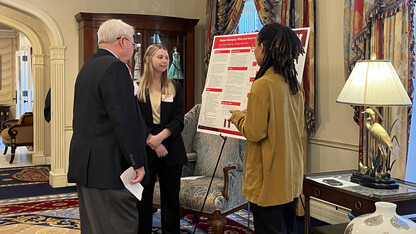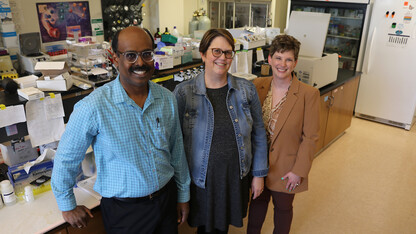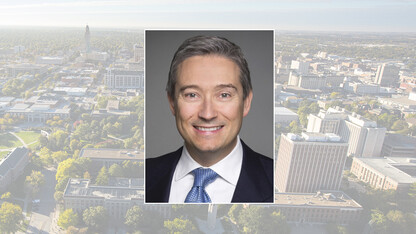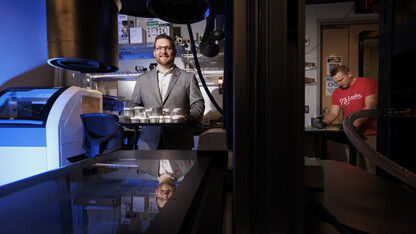· 7 min read
Nebraska names four executive vice chancellor finalists
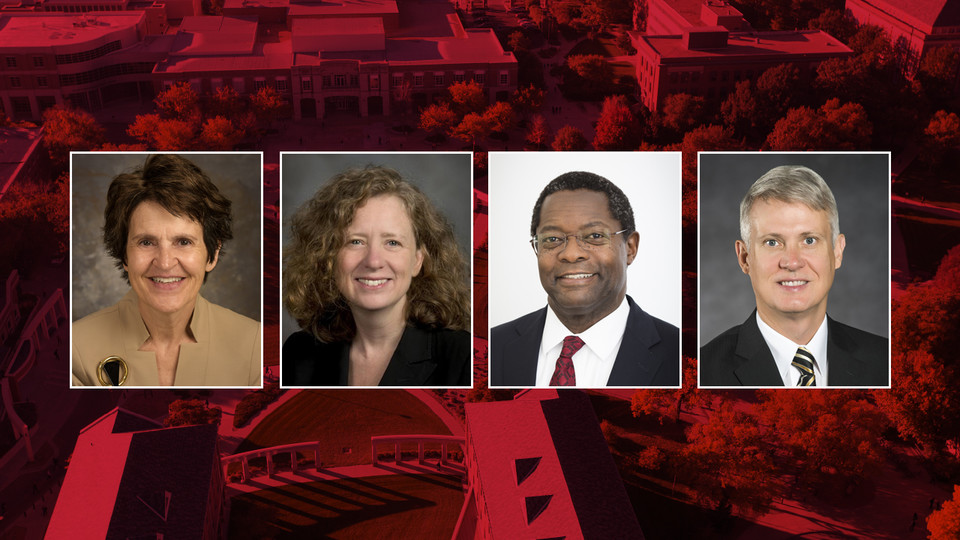
The University of Nebraska–Lincoln has selected four finalists in its search for the next executive vice chancellor for academic affairs. The candidates will visit campus and participate in public presentations between Sept. 30 and Oct. 16.
The candidates, selected through a national search, will participate in multiple-day interviews, including public presentations and receptions. Each public presentation will be 3 to 4 p.m. in the Nebraska Union Auditorium. A reception follows each presentation.
The finalists, listed by their dates on campus, are:
Sept. 30 to Oct. 2 — Laurie Nichols, interim president, Black Hills State University. Nichols’ public presentation is Oct. 1.
Oct. 7-9 — Elizabeth Spiller, dean, College of Letters and Science, and professor of English, University of California, Davis. Spiller’s public presentation is Oct. 8.
Oct. 9-10 — Samuel Mukasa, senior executive for global initiatives, Office of the Executive Vice President and Provost, University of Minnesota. Mukasa’s public presentation is Oct. 10.
Oct. 14-16 — John Wiencek, executive vice president and provost, University of Idaho. Wiencek’s public presentation is Oct. 15.
The executive vice chancellor is the university’s academic leader with the mission of achieving academic excellence across the institution. The position reports directly to the chancellor and, working with the academic deans, will assure pursuit of excellence through oversight of undergraduate teaching and learning; diversity and inclusion; enrollment management; education abroad; faculty development; global outreach; graduate mentoring; libraries, promotion and tenure; student affairs; and by developing innovating academic initiatives that will be recognized as unique signature strengths.
Information about each finalist is below. Learn more about the search.
Laurie Nichols
Interview dates: Sept. 30 to Oct. 2
Public presentation: 3 to 4 p.m., Oct. 1, Nebraska Union Auditorium
Laurie Nichols has served in a variety of academic leadership roles, including a current one-year appointment as interim president of Black Hills State University.
She was the first woman to serve as president of the University of Wyoming (May 16, 2016 to June 30, 2019) and led the university through major budget reductions while maintaining momentum through the development of a five-year strategic plan and supporting a successful submission for a five-year EPSCoR grant. Under her leadership, Wyoming increased enrollment, created an Honor’s College and worked to improve the university’s relationship with two tribes on the Wind River reservation. She led significant campus facility improvements, including a $100 million engineering building and a $45 million athletic performance facility, and began plans for a nearly $400-million residential hall/parking/flood control project.
Nichols has taught at secondary and post-secondary levels in South Dakota, Colorado, Nebraska, Ohio, Idaho and Iowa. She has received numerous teaching and research awards for her work in the creation of the Great Plains IDEA, a 10-state, collaborative, online program.
She has served as provost, executive vice chancellor for academic affairs and dean of family and consumer sciences, each at South Dakota State University; interim president at Northern State University in Aberdeen, South Dakota; and was an American Council on Education Fellow (2006-07) at California State University at Fresno under the mentorship of Jon Welty, president of the institution.
Nichols holds a doctorate in family and consumer sciences education/family studies from Ohio State University; a Master of Education in vocational and adult education from Colorado State University; and a Bachelor of Science in secondary education from South Dakota State University.
Elizabeth Spiller
Interview dates: Oct. 7-9
Public presentation: 3 to 4 p.m., Oct. 8, Nebraska Union Auditorium
Elizabeth Spiller is dean of the College of Letters and Science at the University of California, Davis. With more than 900 faculty across 35 departments, the college serves 15,000 undergraduates and 1,900 graduate students.
At UC Davis, Spiller led the integration of three historic academic divisions into a single college. She also coordinated a push to eliminate the college’s existing deficit and directed new resources to the college.
Spiller also served as dean of the College of Liberal Arts and Human Sciences at Virginia Tech. Under her guidance, an expansion of academic offerings led to a 60 percent increase in undergraduate applications and a more than 40 percent increase in incoming first-year students. She also led initiatives related to faculty excellence, curricular innovation, and diversity and inclusion.
Spiller holds a doctorate and Master of Arts in English and American language and literature from Harvard University; and a Bachelor of Arts in English literature from Amherst College. She specializes in early modern literature and culture, with emphasis on the history of reading, and on literature and science.
She is the author of two books, “Reading and History of Race in the Renaissance” (2011), and “Science, Reading and Renaissance Literature: The Art of Making Knowledge, 1580-1670” (2004), both published by Cambridge University Press. Spiller has twice been awarded fellowships from the National Endowment for the Humanities and earned a Fulbright Fellowship.
Samuel Mukasa
Interview dates: Oct. 9-10
Public presentation: 3 to 4 p.m., Oct. 10, Nebraska Union Auditorium
Samuel Mukasa serves as senior executive for global initiatives at the University of Minnesota. He has served as dean of the colleges of science and engineering at the University of New Hampshire and University of Minnesota for a total of seven years.
In the roles as dean, he was leader of the second-largest college at each of the two institutions, spanning nine and 12 departments, respectively. He provided strategic and intellectual leadership and administrative oversight as well as advancing research, teaching, and service.
For 21 years of his career, Mukasa was department chair and professor of geochemistry at the University of Michigan. Both as chair and as dean, he led development of strategic plans, launched new undergraduate degree programs, and championed faculty cluster hiring initiatives to enhance interdisciplinary scholarship.
Mukasa holds a doctorate in geochemistry from the University of California, Santa Barbara; a Master of Science in geology from Ohio State University; and a Bachelor of Science in geology from the University of New Hampshire. He did his postdoctoral research fellowship at Columbia University in New York.
He has served as president of the Geochemical Society and in leadership positions for programs at the National Science Foundation and National Academy of Sciences focused on polar climate issues. He is a fellow of the American Association for the Advancement of Science and the Geological Society of America.
John Wiencek
Interview dates: Oct. 14-16
Public presentation: 3 to 4 p.m., Oct. 15, Nebraska Union Auditorium
John Wiencek (pronounced Win-sec) is executive vice president and provost at the University of Idaho. He has 30 years of progressively increasing levels of responsibility and success as an academic leader.
At Idaho, Wiencek is responsible for more than 6,000 employees (including approximately 1,000 faculty) and more than 12,000 students seeking degrees in 250-plus academic areas. In addition to Idaho’s main residential campus in Moscow, Wiencek has oversight of education centers in Coeur d’Alene, Boise, Twin Falls and Idaho Falls, as well as extension and research sites across the state’s 44 counties.
Wiencek holds a doctorate and master’s degree in chemical engineering from Case Western Reserve University, and a bachelor’s degree in chemical engineering from the University of Cincinnati. His research focus is in protein biophysics with applications to drug formulations.
He started his academic career in 1989 as an assistant professor at Rutgers University and joined the University of Iowa as an associate professor in 1995. He spent most of his career at Iowa, advancing through academic ranks and earning significant awards for excellence in teaching, service and research. He has also served in leadership roles at the University of South Florida and Virginia Commonwealth University.
